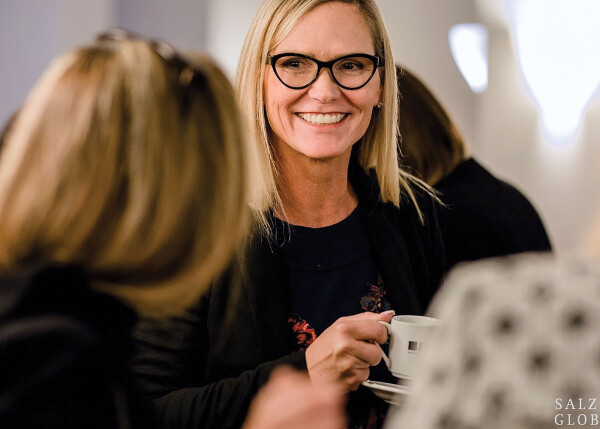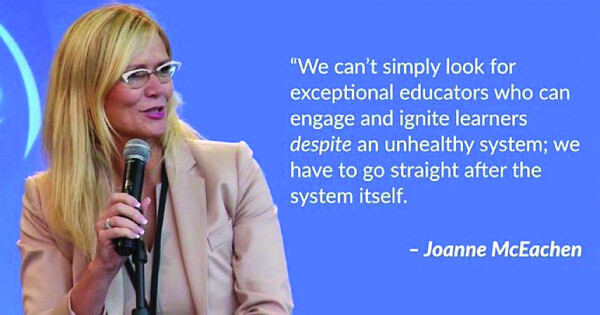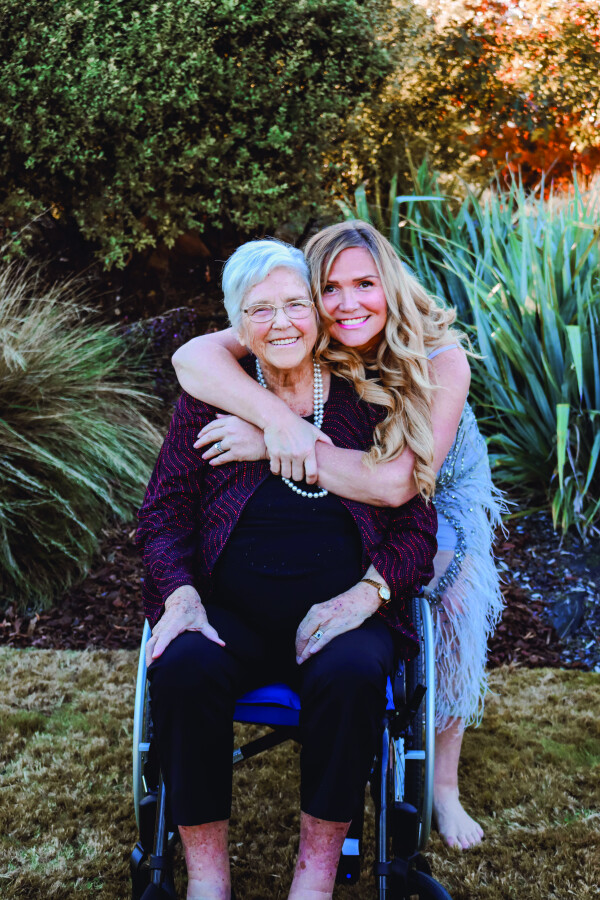Making a Difference
Mar 20, 2024

Global changemaker Joanne McEachen is a force to be reckoned with, overhauling education systems and making a difference for tamariki across the world from her home in Seattle. She is the founder of The Learner FirstTM and a celebrated author and speaker. Her work has earned her numerous accolades, including at home in Aotearoa where she is an Edmund Hillary Fellow and winner of a New Zealand 2023 Kea World Class Citizen Award. Joanne sits down with kaituhi Anna Brankin to share how her whakapapa has guided her every step of the way.

Joanne at the Salzburg Global Summit of which she has been a fellow since 2018. Overleaf: Joanne with her Mum Beverley who passed away in 2021.
When Joanne McEachen (Ngāi Tahu, Ngāti Māmoe, Waitaha) talks about education, she isn’t talking about curriculums and classrooms, test results and qualifications. Those issues are what most people spend their time debating, and she would rather get to the heart of what matters in education – the relationship between teacher and student and the spark generated when the two truly connect. It’s something she first noticed when she was 16 years old, as an exchange student in the United States.
“I had to do a lot of public speaking, particularly to tamariki in schools. I came to recognise that there was an ignition that was going on between people, or an energy transfer,” Joanne says. “And I realised, that’s education! It’s that shift between two people, when we can activate one another to create something better for the world, or to add to the world. That’s the purpose of education.”
The idea of this connection between teacher and student is at the heart of The Learner First, the first company Joanne established in 2012. The Learner First works with schools and teachers in countries across the world, helping them move away from an exclusive focus on academic outcomes and standardisation.
“Academics is a critical outcome of education – yes, but we’re interested in a much broader set of outcomes, and in also measuring what matters,” Joanne says. “Our approach combines global evidence, measurable results and research-driven strategies. We ask: Do teachers know how to create that relationship with the students they teach, and simultaneously do they have the technical skills to tailor their approach to the specific needs of the students right in front of them today?”
The benefits of this approach to teaching seem obvious to Joanne, whose experience as a teacher, principal and public servant in Aotearoa showed her that a one-size-fits-all education system was failing our children – especially tamariki and rakatahi Māori.
“We now know that the achievement gap really only exists in English medium schools. Our kids need to be taught with the understanding of who they are plus the academic rigour that we expect from the best of our kaiako anywhere,” says Joanne. “We’ve got data now across the whole of our country for the past 10-plus years that shows tamariki who go to Māori medium, leave with a higher attainment rate than those tamariki who attend English medium schools.”
This data supports what Joanne saw firsthand during her time as a teacher and principal at schools in Auckland and Hamilton. Joanne’s passion for equitable outcomes in education was sparked, and she began the work that would eventually inform Contributive LearningTM, the framework that The Learner First espouses. It’s focused on four key components: self-understanding, connection, knowledge and competencies.
“It’s critical for our mental health, our success for our future lives that we know who we are, where we come from and how we can contribute our unique set of skills to humanity, Papatūānuku and prosperity – if any part of this is missing we can be ‘pushed over’. I have watched tamariki and teachers almost unfold in front of me as they tū rakatira – stand tall when they know WHO they are and that their set of skills holds huge value. It’s just beautiful.”
A few of Joanne’s strategies included taking her staff to stay with families in Samoa to gain a better understanding of Pasifika culture, as well as encouraging parent teacher interviews in family homes rather than in an intimidating school environment.
When a student told her he didn’t think he was “brainy enough” for university, she found ways to prove him and his peers wrong. “We did a sleepover at the university marae, and we had lecturers come to the school each school term. One of the most exciting things we did was identify Māori and Pasifika university students who were studying to be doctors, technicians, scientists and lawyers, and we paid them to spend time with the tamariki, to play sports with them at lunchtime and talk to them about going to university, about how successful they could be. That gave them some funding for their studies and normalised university for our tamariki.”
Very quickly, Joanne’s efforts brought her to the attention of the Ministry of Education and she was offered roles she hoped would allow her to effect nationwide change. In her six years at the ministry, Joanne was able to achieve some things she is still proud of, including supporting an increase in funding for Māori schools and Māori professional development.

But she was also restricted by bureaucracy and policies, and found herself having to enact difficult decisions that she didn’t always agree with, a challenge she recognises is present for all public servants.
Joanne was feeling increasingly demoralised within the ministry when she met her soon-to-be husband Andrew in the United States on her way to a conference in Sweden. “We met, fell in love and had to decide which country we would live in. I was feeling absolutely unhappy in my role at the ministry so it was a no-brainer for me to come over here,” Joanne says.
As a “recovering public servant”, Joanne says it took her about two years to heal and truly reclaim her voice. During that time, and with the support of her entrepreneur husband, she began working on building The Learner First.
“I was talking about totally new ideas to the American educator population like authentic mixed method assessment and designing learning differently or creating your own curriculum, and how important it was to know the children you were teaching before you started teaching any curriculum to them,” Joanne says. “I had to work really hard to get a foot in the door to get the company going. It was then I also began working with a few other international leaders and started up a global project together involving multiple countries.”
 Today, The Learner First operates in Aotearoa, Australia, Dubai, Hong Kong and the US, partnering directly with schools or districts to deliver a holistic approach to school improvement.
Today, The Learner First operates in Aotearoa, Australia, Dubai, Hong Kong and the US, partnering directly with schools or districts to deliver a holistic approach to school improvement.
Joanne’s method revolves around a strengths-based approach, measuring not only academic but also social outcomes. She talks a lot about ako: learning in the spirit of reciprocity – you can’t do one without the other. She supports schools and at times whole systems to be a genuine part of a community.
Although Joanne lives in Seattle and works across the globe, she is still as determined as ever to see equitable outcomes in education for all Māori and Pasifika whānau. “Interestingly enough, whenever I step out of the country, I can look back and see things so clearly,” Joanne says. “It brings this crystal clarity and I find mātauraka Māori seeping its way into all of my writing.”
Joanne has formed a close partnership with Te Pā o Rākaihautū through her Edmund Hillary Fellowship and her charitable trust, Kia Kotahi Ako (Learning As One), established in 2021. Joanne says her association with the Te Pā team feels like a homecoming. It marks the first instance in her life where she can engage with Māori in a Māori setting, experiencing the uncomplicated joy of embracing her Māori identity and feeling truly liberated.
Joanne’s deep connection to her Māoritaka began in childhood, although she didn’t know it at the time – it was just the way that her whānau lived.
“My mother was very tuned into our tīpuna, and she taught me how to listen to them and to connect to the natural world. She lived by the moon phases,” she recalls. “She was incredibly spiritually strong, and she used to talk about doing the ‘inner work’. But I didn’t necessarily know that was a Māori way of living – it was just our life.”
Being blonde and fair-skinned, Joanne sometimes felt insecure about her identity as a wahine Māori, especially once the whānau moved to the North Island when she was about 13 years old. Despite her fierce advocacy for Māori throughout her career, it was only recently that she really reconnected with her whakapapa.
“Around the time the pandemic hit, I felt a karanga to come home,” Joanne says. Her mother’s health was failing, and living and talking to her in her final months helped Joanne understand how much of her worldview had been handed down from her tīpuna. She travelled to Riverton and spent time exploring her marae and local museum, learning more about her history.
“I remember Mum telling me stories about playing in the Aparima river,” Joanne says. “I went into the museum and when the curator there realised I really was interested he showed me a whole room full of extra artifacts. My whole life was just changing every five seconds, it was like
I was just reintegrating into this whole moment in time, seeing generation after generation just being opened up.”
Joanne sees her passion and drive as a gift that has been handed down from her tīpuna, and draws strength from their legacy. “I’ve got three companies, one in New Zealand, one in Australia and one here in America, I am the Chair of our charitable trust, I write books, I speak all over the world, and I am invited to be on global boards,” she says.
“But some days, when I am alone in a hotel room somewhere in the world, missing my whānau – I do think, why do I do this? Then something will happen to remind me why. I see that as my tīpuna holding me up, reminding me that I have been given these skills and that this is my way to contribute to humanity, for all our generations to come.”